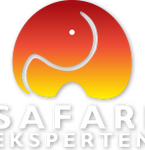Experience Africa at its most authentic: Botswana
In Botswana, people are few and far between, but the same cannot be said for the wildlife. The country is bigger than France, but less people live here than in Copenhagen and its surroundings. Despite the fact that Botswana is largely flat, its landscapes are still magnificent and very varied in nature. This is why Botswana can offer some of the very best safaris in the whole of Africa.
Unique safaris with an active fauna
In the northern part of the country, water flowing down from the Angolan highlands gathers into the Okavango River, which in turns flows into the world’s largest inland delta, the Okavango Delta. This huge delta does not flow into the sea, here the river waters are swallowed up by the Kalahari Deseret. The waters of the delta’s many channels and their associated wetlands form the basis of an extremely rich and varied fauna and flora.
In the north east, most safari activities are centered around the Chobe River, which offers excellent boat safaris, the surrounding Chobe National Park and the mysterious Salute Channel to its south and its surrounding plains. Here you can find the largest population of elephants in Africa. Nearly 20% of Botswana is covered by national parks and game reserves, but of equal importance is the fact that there are large areas of basically uninhabited land outside of the parks that is still accessible for the wildlife. This means that species such as zebra and wildebeest are still able to complete their natural annual migrations in search of water and the best grazing. In and around the Linyanti Swamps and the Okavango Delta you can enjoy excellent safaris in privately run concessions with amazing camps. Here you can, generally speaking, find many animals of many different species, but this area is probably best known for its many large predators, and the frequent predator-prey interactions seen on safari, as well as its boat safaris, in both motor boats and traditional canoes called mokoros.
Resilient and adaptable wildlife
In central and southern Botswana, which covers around three quarters of the country, the environment is very harsh. In the summer it is dry and hot, while in winter there can be frosts during the cold clear nights. It is here that you find the Kalahari Desert. The landscape is dominated by low, hardy herbs and bushes, that can appear to be totally withered in the very driest periods. However, if one of the rare showers of rain falls, they will quickly turn green again and rapidly start to bloom. Thus the Kalahari desert is not dominated by the large areas of bare sand, that many people associate with deserts, although they do occur in certain places. The Central Kalahari is Botswana’s largest protected area of land, covering an area of some 50,000km2. This area lies, as its name suggests, in the middle of the Kalahari Desert, while on the salt plains in the northern part of the desert you can find the Makgadikgadi and Nxai National Parks. These areas are a great place to see species adapted to desert conditions, including antelope species such as springbok and gemsbok and the world’s biggest bird, the ostrich. In some places good numbers of the animals that prey on these species, especially cheetahs and lions, can also be found.

BOTSWANA HIGHLIGHTS
- Boat safaris on the Chobe River, where you can approach closely to large number of elephants
- Safari drives in game-rich Linyanti, where you can often see interactions involving the large predators here
- Silent, idyllic boating trips is dugout canoes - mokoros - on the Okavango DeltaThe dry, atmospheric landscapes of
- the Kalahari, where you can see many animals adapted to desert conditions.
Practical information for tours to Botswana
Passport & visa regulations for entry into Botswana
On arrival in Botswana you must pass through passport and visa control.
All immigration personnel speak English.
Passport Regulations:
- Your passport must be valid for at least 6 months after your expected arrival back home.
- Your passport must have at least 3 blank pages available.
Visa Regulations:
Citizens of the EU, Norway and most developed countries do not require a visa for visiting Botswana for up to 90 days.
On arrival in Botswana you will be given an immigration form which you must fill in and give to passport control. Remember to pack a pen in your hand luggage.
Important Information when travelling with children:
Regulations have been introduced governing the entering and leaving Botswana with children under 18 years of age.
If both parents are travelling with the child, then you must bring its birth/baptism certificate.
If only one parent ir travelling with a child under 18 years of age, then they must bring its birth/baptism certificate plus a letter of consent from the other parent giving permission for the child to travel to and from Botswana.
If neither of the parents are travelling with the child then the accompanying adult must bring its birth/baptism certificate, plus a governmental letter showing that you are legally entitled to travel with the child in Botswana for the given period.
If you are travelling with an adopted child, in addition to the birth/baptism certificate you must also bring the adoption certificate. These rules were introduced by the Botswana government to prevent trafficking of children.
We must stress that it is very important to bring the correct documentation if you are travelling to Botswana with children. ALL documentation must be in English. It is your responsibility to bring the correct documentation and if you are not in possession of such you will be not be able to check-in and therefore unable to travel.
Recommended vaccinations for travellers visiting Botswana:
We recommend that you receive vaccinations against the following diseases before departure:
- Diphtheria
- Hepatitis A
- Tetanus
Note: if you are travelling from a country that is listed as a yellow fever district, then you must bring a certificate to show that you have been vaccinated against yellow fever to gain entry to Botswana.
The information given above is for guidance only, Askari Tours recommends that you always talk to your own doctor or vaccination clinic.
You can read more about vaccinations at www.vaccines.org
Medicines when visiting Botswana:
We recommend you bring any medicines prescribed to you by your doctor with you.
We also recommend you bring along painkillers and anti-diarrhoea tablets.
There are pharmacists in the larger towns, but naturally not in thinly populated districts, so it is important you bring along what you need from home.
Malaria prevention:
We recommend you start a course of malaria preventative medicin before your departure for Botswana, and continue it during your tour and after you return home.
Please follow the instructions given with the product you use carefully.
Many of our guests have been very satisfied with the product Malarone, which also gives a broad coverage against malaria.
We always recommend you seek advice from your own doctor or vaccination clinic about malaria prevention.
Bagage regulations on tours to Kenya:
On most of our tours to Kenya it is important you pack your luggage in a soft bag or case. Hard cases are not allowed, as it is not possible to pack them into the safari vehicles.
You are allowed to bring along 1 x bag/case plus 1 x small rucksack/camera bag per person.
As the amount of space available in the vehicles used is limited, we request you limit the amount of clothing you bring along, as it will be possible to get laundry done at a number of places on tour.
On small aircraft flights to/from the savannah:
If you have booked a tour which includes flights to or from the bush, you may bring along 1 bag or case of max. 15 kg. plus 1 item of hand luggage.
It is very important that you bring soft bags or cases, as hard cases cannot be packed efficiently in small aircrafts, which might mean in the worst case scenario that the pilot will refuse to bring along your luggage.
Packing list for tours to Botswana:
We recommend that when you go on safari you bring clothes in natural colours, such as khaki, sand, greens and browns. Don’t bring clothes made of artificial fibres, as these tend to be uncomfortable in hot climates. We recommend clothes made of cotton.
It can be very cool in the evening and first thing in the morning, particularly in the African winter months, so it is important you pack some warm clothing.
We recommend that you bring the following with you on your tour:
- 1 pair of good outdoor shoes
- 1 pair of sandals or flip-flops
- 1-2 long sleeved sweaters/fleeces
- 1-2 pairs of long outdoors trousers (we recommend zip-off trousers)
- Shorts
- T-shirts / shirts
- Bathing costume
- Socks and underwear
- Sun hat / cap
- Sunglasses
- Mosquito repellent
- Sun cream/aftersun lotion
- Camera and plenty of memory cards
- Small rucksack which can be brought along on safari drives
- Ballpoint pen
- Travel adaptors
Currency in Botswana
The local currency in Botswana is the Pula. You cannot obtain
Pula abroad, you can first buy them on your arrival in Botswana.
We therefore recommend that you bring US$ or € with you from home, as
these can be exchanged all over Botswana.
On arrival in Botswana we recommend you exchange your dollars for Pula.
€1.00 = circa. 12 Botswana Pula
How much cash should I bring with me on holiday?:
Most of your expenses will already be taken care of when you book a tour to Botswana with Askari Tours, therefore you will only need to bring a limited amount of cash.
In most hotels and lodges in Botswana you can pay for drinks and similar items with an international credit card.
Please note, it is usually NOT possible to withdraw cash or exchange currency in most hotels/lodges.
You should bring along enough cash to be able to pay for the following on holiday:
- Cash for tipping
- Cash to pay for excursions and souvenirs
Please note: on some of our tours in Botswana you must bring a “local payment”, which must be paid in cash to your guide before departure. We will confirm whether you need to do this on your tour to Botswana in the printed offer we send you at the time of booking.
It is possible to withdraw cash in all large towns in Botswana.
What do food and drinks cost?:
- €2 – €3.50 for a soft drink or beer
- €15 – €27 for a bottle of wine
- €10 – €20 for lunch
Tipping while on holiday in Botswana:
It is normal to tip for services received in Botswana, but of course it is not compulsory. We recommend you give a tip if you are satisfied with the service you have received.
Drivers & guides:
€10 - €15 per person per safari day to driver / guide.
Tips should be given on the last day of your safari, before you are taken to the airport.
If you go sailing in a mokoro we suggest a €5 tip for you pole-man.
Hotels/lodges & restaurants:
In hotels/lodges you will often find a box for tips in the reception, we recommend that you leave €5 per person per night.
By placing your tip in the box in reception you know that the money you leave will be divided equally between all the staff.
In cafes and restaurants that are not a part of your hotel, we suggest that you leave around 10% of your bill as a tip.
We further recommend you give circa €1 per bag to the porter who carries your bag to your room at your hotel/lodge.
We recommend that as far as possible you leave tips in local currency.
Buying souvenirs in Botswana:
There will be several opportunties to buy some great souvenirs to remind you of your fantastic holiday. Popular items include beautiful figures carved from wood or soapstone. You can also find jewellery, drums, basket work, leatherwork and different types of batik.
The quality of the items on offer can vary greatly, so we recommend that you always seek your guides advice, he will be able to tell you where you can find items of good quality.
Prices can vary greatly from place to place, and it is normal that you haggle over the price. Aim to bargain the asking price down by 30 – 50%, which would mean that both you and the seller get a good deal.
Internet & mobile telephones in Botswana:
Mobil coverage in Botswana is good close to large towns. However in safari areas you will often experience getting a very poor signal or no signal at all.
But remember it is very expensive to use your telephone from home in Botswana. If you will need to make calls or use data etc. from your own phone during your stay in Botswana, we recommend you buy a sim card when you arrive at the airport.
Today most hotels and lodges in Botswana offer WIFI and a reasonable internet connection.
Electricity in Botswana:
Lodges and camps in Botswana use 3-pin plugs, so we recommend you bring travel adaptors from home if necessary. A few places have adaptors you can use for hire/loan in reception.
Many lodges and hotels in the bush are powered by solar cells or generators, which are turned off at night and during the times the guests are out on safari. If you need to charge your camera etc. it is a good idea to ask at reception at which times this will be possible.
Time zone in Botswana:
Botswana is 1 hour ahead of CET, and the same as CET summertime.
Attractions
Wildlife in Botswana
Highlights:
- If you are wild about elephants then Botswana is the ultimate festinate for you as it is the country with the biggest populations
- Buffalo and hippos are common in the wetlands of the north, but rhinos are rarely seen
- Impressive populations of all the large predators - and many conflicts between them
- Plenty of other classic big game animals such as giraffe, zebra, wildebeest , greater guru and impala
- Many unusual antelope adapted to wetlands and an impressive avifauna in the north of the country
- Numerous birds and large animals adapted to desert conditions in the dry southern part of the country
Botswana is the country that has set aside the biggest percentage of its area to nature conservation in Southern Africa. Also, and perhaps because of this, it has the most dense populations of big game in this area, which are comparable to those you can find in East Africa. Botswana is a relatively flat country, but despite this the landscapes here are very varied and range from the harsh, dry conditions of the Kalahari desert, and the huge salt flats that cover over half the land to the south, to the lush savannah and riverine forests around the rivers in the north and the outstanding wetlands of the Okavango Delta in the north west.
If elephants are at the top of the list of animals you would like to see, the Botswana is the obvious choice. There are many elephants in a large area in the north of the country, especially in Chobe, which has the largest population of elephants in Africa, and sometimes teems with these animals. In these areas it is also possible to see large herds of buffalo, while hippos and crocodiles are common in the shallow rivers and lagoons. On the other hand rhinoceros are hard to find in Botswana, and you will only spot one in the Okavango Delta if you are very lucky indeed. If you want a good chance of seeing one you should visit a fenced reserve near the capital city, Gaborone, but this is some distance from the most popular safari districts.
All the large carnivores such as lions, leopard, cheetah, spotted hyena and even the generally rare African Wild Dog, are common in northern Botswana and are seen often. The area is famous for the regular conflicts that occur between these animals. You can also find a number of predators in the drier, more open habitat of the salt flats and in the Kalahari. Here you can see lions, cheetahs and the rare brown hyena.
Amongst the other large game animals you can see at most places in Botswana, are the giraffe, zebra, wildebeest, greater kudu and impala. In the drier districts, animals adapted to desert conditions, such as the springbok and gemsbok, are common, while antelopes adapted to living in the wetlands, such as the red lechwe, puku, waterbuck, sitatunga, are common in and around the Okavango Delta. The birdlife is also impressive, especially in the wetlands, but the drylands are also home to many of the classic birds of the savannah, especially birds of prey.


























